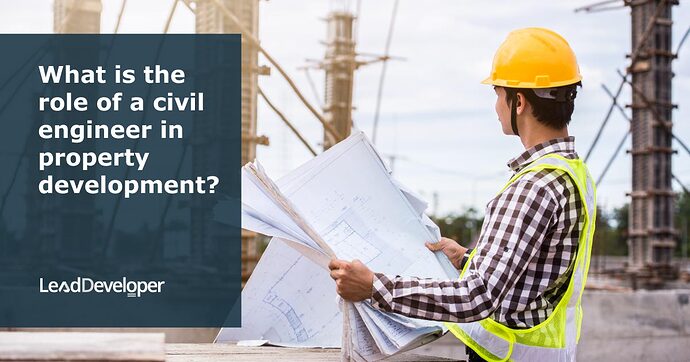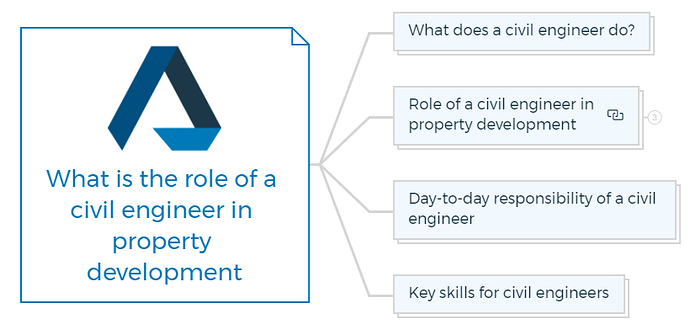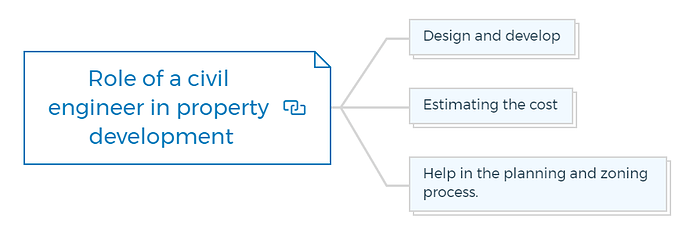Civil engineers play a crucial role in property development projects, from the initial planning stage to the final construction phase. Their expertise is essential in ensuring that the project is executed efficiently, safely, and within budget.
What does a civil engineer do?
The civil engineer designs the drainage, earthwork, roadwork, and water and sewer systems for the building permit.
Civil tasks in land subdivisions are different from building tasks. The civil engineer might also create the tender documents and oversee the civil works done by the civil contractor.
Civil engineers upgrade or build infrastructure that provides essential services worldwide, from clean water and electricity to houses and sewage recycling.
They handle environmental issues, restore settlements after natural catastrophes, and solve complex civil problems.
Civil engineering professionals do far more than design work.
Civil engineering has many specialties, including:
- Structural
- Municipal
- Transport
- Geotechnical
- Environmental
You are missing out if you haven’t yet subscribed to our YouTube channel.
Role of a civil engineer in property development
A civil engineer plays a crucial role in land subdivision by providing technical expertise and services for the design and development of infrastructure such as roads, water and sewage systems, drainage, and other related structures.
They are responsible for ensuring the infrastructure’s safety, functionality, sustainability and compliance with local regulations and standards.
Additionally, they may assist with the planning and zoning process, site analysis, and cost estimating.
A civil engineer’s role in the land subdivision is multifaceted and can involve various tasks and responsibilities.
Design and develop
The primary focus of a civil engineer in a land subdivision is to design and develop the infrastructure required for the new community or development.
Civil engineers ensure that the infrastructure they design is safe, functional, and sustainable. They also ensure that all projects comply with local regulations and standards, including zoning, land use, and building codes.
Based on this analysis, the civil engineer will design systems and structures that are suitable for the site and meet the requirements of the local authorities.
Estimating the cost
Another critical aspect of a civil engineer’s role in a land subdivision is cost estimating.
They must determine the cost of materials and labour required for the construction of the infrastructure, considering the project’s size and the complexity of the systems and structures involved.
They must also consider the long-term costs of maintenance and repairs and the cost of any necessary upgrades or modifications that may be required in the future.
Help in the planning and zoning process.
Civil engineers may also assist with the planning and zoning process. They may work with the developer and other professionals, such as surveyors and planners, to determine the best use of the land and the most efficient and cost-effective way to develop it.
This may involve preparing site plans, maps, and other graphical representations illustrating the proposed infrastructure and land use.
In conclusion, a civil engineer plays a critical role in the land subdivision process. They bring technical expertise and experience to the table, ensuring that the infrastructure is safe, functional, and sustainable. Their knowledge and skills are essential for ensuring the success of the development and for creating vibrant and livable communities for future generations.
Property Development “How To’s” & Frequently Asked Questions
Includes 5 x detailed eBooks [142 pages]
✓ How To Become A Property Developer? In 10 Easy Steps (51 Pages)
✓ How To Overcome Fear In Property Development? (15 Pages)
✓ How To Become A Real Estate Developer? Without Experience (37 Pages)
✓ Property Developer FAQs – Who, What, When, How? (20 Pages)
✓ How To Become A Real Estate Millionaire In 10 Steps? (19 Pages)
Day-to-day responsibility of a civil engineer
- Discuss project needs with customers to choose sites and plans.
- Determine the construction process and material used in it.
- Predict costs and assess project efficiency.
- Organise site labour and construction supplies and equipment delivery.
- Apply for authorities’ approval and get building permits.
- Oversee building to guarantee quality.
- Consider population growth and travel trends.
Learn More
Key skills for civil engineers
Employers seek commercially savvy and team-oriented graduates. Additional important skills:
- IT, mathematical, and scientific skills.
- Systematic thinking and project management.
- Ability to meet deadlines and budget.
- Capacity to oversee tasks while focusing on details.
- Communication skills.
- Negotiating, supervisory and leadership skills.
Learn More






